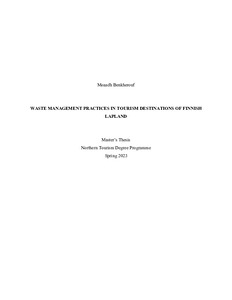Waste management practices in tourism destinations of Finnish Lapland
Benkherouf, Moaadh (2023-06-16)
Benkherouf, Moaadh
Lapin yliopisto
16.06.2023
Julkaisun pysyvä osoite on
https://urn.fi/URN:NBN:fi-fe2023061656267
https://urn.fi/URN:NBN:fi-fe2023061656267
Tiivistelmä
Tourism in Finland holds a significant position in Finnish economy, extending from Southern to Northern Finland, and sustainable tourism is being heavily promoted nowadays. This study focuses on waste management practices as one of many important topics related to sustainability and sustainable tourism, implementing qualitative data analysis, and applying practice theory as a theoretical approach. The research subject revolves around understanding the current situation of solid waste management in tourism, how existing issues in certain practices are addressed, and how the whole waste management system can be improved. Four semi-structured thematic interviews were conducted with stakeholders in the tourism industry, namely Destination Marketing Organization (DMO), academic, waste management company, and tourism resort. The findings conclude that the practices generating the most waste in Lapland are related to consumption, biowaste, and building projects, which further supports literature that discusses these practices. Recommendations for improvement mostly revolve around implementing local waste treatment possibilities, in addition to increased education, raising awareness, and close collaboration, utilizing a multichannel approach in these. The study also recommends further research on the status of waste beyond collection, in addition to exploring the possibilities of adopting innovative waste management practices that have been successfully implemented in different parts of Europe. The study was limited in the sense that it did not involve a case study due to the anonymity of the participants, which present an opportunity in the future for area-specific studies for waste management practices in Lapland.
Kokoelmat
- Pro gradu -tutkielmat [4969]
